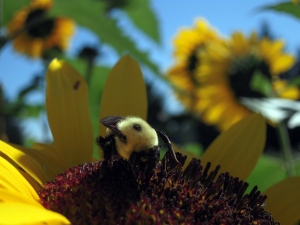A Group of Passionate and Committed Citizens
The Society for Biodynamic Farming and Gardening in Ontario’s Response to the Provincial Neonicotinoid Regulation Process
By Karen Davis-Brown
Never doubt that a small group of thoughtful, committed citizens can change the world. Indeed, it is the only thing that ever has. — Margaret Mead
 In November 2014, the Ontario Ministry of Agriculture, Food, and Rural Affairs (OMAFRA) posted a discussion paper regarding limiting the use of neonicotinoid pesticides in the province, as one approach to supporting pollinator health. This paper presented and examined recent scientific findings related to this issue, and proposed “an aspirational target of 80 per cent reduction in acres planted with NNI-treated corn and soybean seed by the year 2017.” The news of this courageous and hopefully trend-setting goal spread throughout the organic and biodynamic communities, including the membership of the Society for Biodynamic Farming and Gardening in Ontario.
In November 2014, the Ontario Ministry of Agriculture, Food, and Rural Affairs (OMAFRA) posted a discussion paper regarding limiting the use of neonicotinoid pesticides in the province, as one approach to supporting pollinator health. This paper presented and examined recent scientific findings related to this issue, and proposed “an aspirational target of 80 per cent reduction in acres planted with NNI-treated corn and soybean seed by the year 2017.” The news of this courageous and hopefully trend-setting goal spread throughout the organic and biodynamic communities, including the membership of the Society for Biodynamic Farming and Gardening in Ontario.
Ontario is a large, diverse province in every way — culturally, geographically, agriculturally — and the biodynamic community reflects that diversity. Getting together in person is challenging, and we depend a great deal on email, phone, and our monthly newsletter. Fortunately, our community has also been encouraged and supported by the Society leadership to share their unique experiences and perspectives with each other across the miles. These precedents for strong communication and ownership came into play in the community’s response to OMAFRA’s process.
Some members tracked the process of the regulation and kept the rest of us informed via emails. Reports on the process were (and continue to be) published in the newsletter every month. But in the few weeks before the deadline for public comment on the discussion paper, something very special happened that took the Society’s work to a new level.
It started with one member asking the Board, “What should we, as individuals, write that represents our shared viewpoint?” A flurry of emails across the province, and even Quebec and the U.S., took that question seriously: “How do we best convey our concerns and support regarding neonic pesticides and pollinator health, as a community, in public comment to a governmental body?” Over the next few days, ideas and feelings and phrasing flew across the miles, for negotiation, comment, fine-tuning. Demeter USA and Canada were both consulted regarding their current guidelines. Differences were discussed and negotiated in a camaraderie and collegiality that could only come from a strong foundation of respect and shared pragmatic idealism. Many members submitted individual comments, and both the Society board and Demeter Canada submitted official statements of their stands.
In April of this year, Society Board President Chris Boettcher and his wife Gabi (a crucial and active member of the Society in her own right) attended a large banquet put on by the Organic Council of Ontario, where the OMAFRA Minister was the keynote speaker. He spoke knowledgeably and articulately regarding many issues, including the pending neonics regulation. To the group, and to Chris and Gabi personally, he expressed his gratitude for the comments that had been submitted, saying that they had a substantive effect on the subsequent work of the Ministry on the regulations.
On June 9th, the following was included in a press release by the Ontario government:
On July 1, 2015, new regulatory requirements for the sale and use of neonicotinoid-treated seeds in Ontario will come into effect and be phased in over a period of time. The requirements will support the province’s target to reduce the number of acres planted with neonicotinoid-treated corn and soybean seed by 80 per cent by 2017 and are focused on ensuring that neonicotinoid-treated corn and soybean seeds are used only when there is a demonstrated pest problem. Reducing neonicotinoid use in these two crops presents the greatest opportunity to decrease pollinator exposure to the neurotoxic insecticide.
This decision makes the Ontario government a continental leader for what we hope can only be a trend in the rest of Canada and the U.S. In this case, a group of passionate and committed citizens did, indeed, change the world, in working together in support of their shared understanding of agricultural and environmental health.